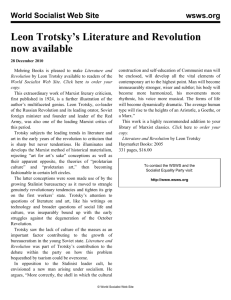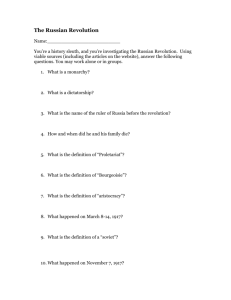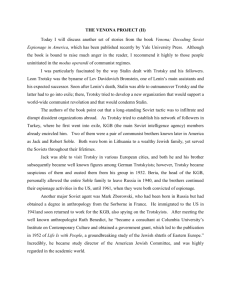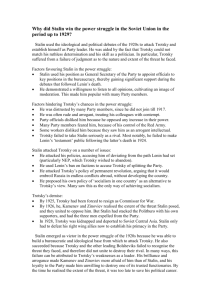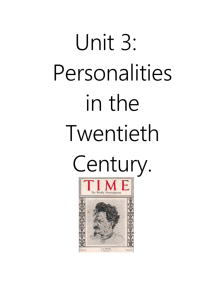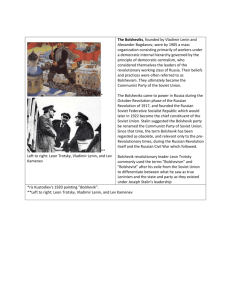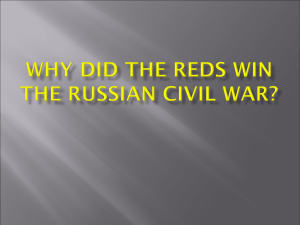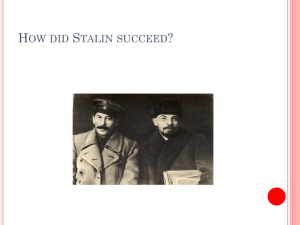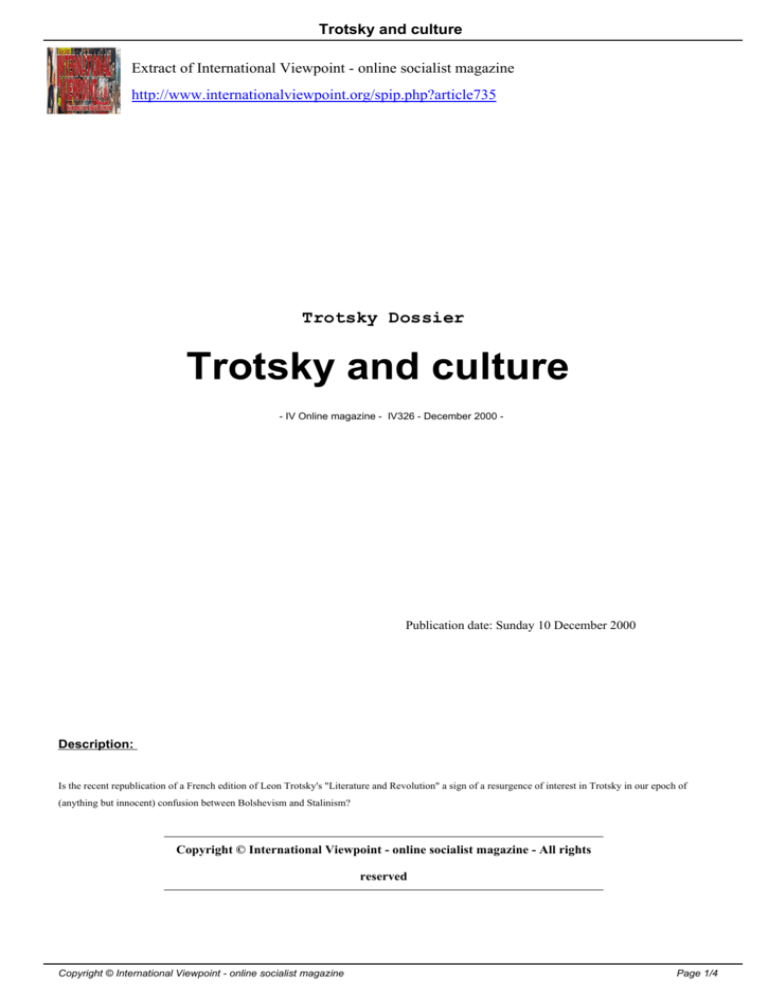
Trotsky and culture
Extract of International Viewpoint - online socialist magazine
http://www.internationalviewpoint.org/spip.php?article735
Trotsky Dossier
Trotsky and culture
- IV Online magazine - IV326 - December 2000 -
Publication date: Sunday 10 December 2000
Description:
Is the recent republication of a French edition of Leon Trotsky's "Literature and Revolution" a sign of a resurgence of interest in Trotsky in our epoch of
(anything but innocent) confusion between Bolshevism and Stalinism?
Copyright © International Viewpoint - online socialist magazine - All rights
reserved
Copyright © International Viewpoint - online socialist magazine
Page 1/4
Trotsky and culture
Is the recent republication of a French edition of Leon Trotsky's "Literature and
Revolution" [1] a sign of a resurgence of interest in Trotsky in our epoch of (anything but
innocent) confusion between Bolshevism and Stalinism?
It will be interesting to see whether the leading lights of contemporary literary criticism greet it once again with
silence. But it will be a safe bet to say that, with the assistance of postmodernism, the general tone will be negative,
despite the fact that it takes tremendous intellectual confusion to read into Trotsky the opposite of what he wrote.
To anticipate the criticisms, let's note at once the most frequently committed sin in the reading of texts from the past:
anachronism. This study from 1923 was written in a brief moment of calm and freedom between the end of the civil
war and the Soviet Thermidor, i.e. the elimination of Trotsky and the seizure of power by the
Stalin-Zinoviev-Kamenev triumvirate. Trotsky was enjoying a breathing spell at a time when the battle of schools was
raging among the intellectuals. All his life, even during the civil war, Trotsky read to relax. He was without doubt one
of the most cultivated of the Bolshevik leaders (Annenkov, the great painter, a Left Social Revolutionary, who left the
USSR in 1924, said in the 1950s that Trotsky was the only cultivated Bolshevik leader. This was unfair, at least to
Lunacharsky). Like Lenin, Trotsky was at that time disturbed by the leftist and workerist drift on the art and literature
front. The idea of a socialist, or proletarian art was for him a nonsense, not only impossible in the period of transition
and in a country where even the working class was culturally backward, but quite simply because the proletariat
could only realize itself by abolishing itself and a new art, a new culture could only exist in a classless society. What
was possible and should be the intelligentsia's objective, was a revolutionary art and literature, of which Trotsky gives
two possible definitions corresponding, one might say, to two stages: "the works whose themes reflect the
Revolution, and the works which are not connected with the Revolution in theme, but are thoroughly imbued with it,
and are Colored by the new consciousness arising out of the Revolution".
Far from underestimating what emerges then, he emphasizes what he calls the "October divide". Admittedly, this is
open today to qualification insofar as the date seems excessively precise. In fact, the revolution in art and literature in Russia as in the whole of Europe - began in the first years of the century, but precisely as harbinger of the
ideological impulses which were to come to fruition with the revolution. And with the benefit of hindsight, we can see
clearly the ways in which the October revolution strengthened and clarified the avant-gardes which were going to
dominate the century. Distance even allows us to discern how the radicalization of art, poetry and fiction spread
following the waves of the revolution, from Russia, through Germany and thence to France and the rest of the world.
In 1923, Trotsky was probably the only person to have developed the Marxist analysis of literature to such a point. He
is severe, "and that smacks of censorship" according to our modern critics, who know only how to flatter fashionable
contemporaries and worship the hallowed dead. In Russia, these latter were Trotsky's contemporaries and, in the
violent intellectual debates of the day, the absence of any criticism of one of the schools would have appeared as
support, which, coming from such a senior figure, would have had precisely the "authoritarian" effect for which his
critics have unfairly reproached him.
However, Trotsky could not be and was not neutral. He clearly perceived the dangers lurking in the demand by some
schools to be proclaimed the only authentic artistic expression of the revolution, the theory of proletarian culture and
literature, as well as Soviet cultural chauvinism. Was it not on such theoretical foundations that the edifice of
"socialist realism" was erected?
This was what Trotsky most violently opposed, condemning "Marxists in literature who have taken an arrogant
Copyright © International Viewpoint - online socialist magazine
Page 2/4
Trotsky and culture
attitude toward Futurists, the "Serapion Fraternity", Imagists and all the fellow-travelers in general, together or
separately". And, contemptuously rejecting the criticisms of the supporters of this "proletarian art", according to whom
the absence of intervention would be, on the Party's part, the expression of an "eclectic position on art", he states:
"The Marxian method affords an opportunity to estimate the development of the new art, to trace all its sources, to
help the most progressive tendencies by a critical illumination of the road, but it does not do more than that. Art must
make its own way and by its own means. The Marxian methods are not the same as the artistic. The party leads the
proletariat but not the historic processes of history. There are domains in which the party leads, directly and
imperatively. There are domains in which it only cooperates. There are, finally, domains in which it only orients itself.
The domain of art is not one in which the party is called upon to command".
I want to stress the fact that Trotsky stated his support for creative freedom loud and clear in 1923. There was
therefore no change of position when he insisted, in the 1938 Manifesto for an Independent Revolutionary Art, on
proclaiming "total freedom for art", rejecting even the reservation proposed by André Breton of "except against the
proletarian revolution".
This clearly shows the meaning of his criticisms of those for whom he had the highest regard. It is significant that the
poets and novelists to whom he devoted the most important chapters are precisely those we continue to consider as
the classic writers of the Soviet revolutionary period: Yesenin, Pilnyak, Blok and Mayakovsky - the highpoint of Soviet
futurism. As for his criticisms of them, it should be borne in mind that Pilnyak was only at the beginning of his rise,
which was moreover swiftly checked, and that Mayakovsky's "gigantism" was both the essence of his greatness and
of his weakness in the short-circuit with the moral wretchedness of the rising bureaucracy. In the text Trotsky wrote
on the poet's death, when advice was no longer appropriate, he talked about Mayakovsky's "enormous talent" which
was "touched by genius" and wrote that he had been "one of the most indisputable precursors of the literature which
the new society will being forth". He pointed out, finally, that his suicide came two months after the capitulation
represented for him by the obligation to join the "administrative kolkhoz of the supposed proletarian literature", the
Soviet Association of Proletarian Poets. [2]
Is the criticism Trotsky wrote in exile fundamentally different from that of 1923? Those who have insisted on this point
have tended to emphasize that the "dictator" had moderated his severity. Here too this is the product of a distorted
starting point. Without this distortion, admittedly, one can descry an evolution in his approach to modern literature.
But this has nothing to do with his personal situation. It is the result of the development of culture itself and how
Trotsky discovers and develops his own appreciation of it. The paradox is that what developed after the "October
divide" was unexpected even for the person who had underlined its importance. Let us not forget that Trotsky was
thirty-eight in 1917. The culture of any cultivated person of the period was essentially based on the major European
writers of the end of the 19th century, many of whom were still alive in 1914 and even later and that the new trends
were barely perceptible, even for the educated sections of the general public. For Lenin, Tolstoy remained the crucial
figure in contemporary Russian literature. Trotsky (and Lunacharsky) stood out for their openness to the new trends.
But, in the final period of his life, he had even less time for reading than in his youth. His criticism is not that of a
professional striving to find everything of importance which might be emerging, but of a revolutionary fighter who
selected what he found was best able to throw light on the motive forces of intellectual trends in society, particularly
works produced by people he was close to, and which most powerfully expressed international intellectual trends.
Thus, his later texts do not present an overview of interwar literature like in the 1923 book, but simply the reading of a
revolutionary in that period. And, from that point of view, the most surprising thing is that he was drawn precisely to
the essential authors of the time and analyses them with an insight they did not meet with from contemporary
professional critics. Let's look at this point in relation to Malraux and Céline, whose future course was already
grasped by "the prophet".
At a time when the critics all considered Malraux as a revolutionary writer, Trotsky saw right through him and
exposed the substance of the future Gaullist minister. This "severity" (of a man without power but nonetheless equal
to even stronger than that of the "dictator" of 1923) did not stop him admiring the novelist's talent and hope for
Copyright © International Viewpoint - online socialist magazine
Page 3/4
Trotsky and culture
progress, which he found in La Condition Humaine, whose publication he recommended in the United States.
As for Céline, Trotsky's critique of "Journey to the End of the Night" was the best ever written. His admiration for this
book is immense. He emphasises the "new thrill" it creates in literature. But he shows that, more than rebellion, this
"novel of pessimism" is inspired by horror at life and world weariness. He exposes the contradictions of the man
which were going to lead him to destruction. And he writes this prophetic conclusion: "Céline will write no more
novels expressing such aversion to lies and suspicion of the truth. This dissonance must resolve itself. Either the
artist will accommodate to the darkness or will see the daybreak." As we know, Céline's subsequent work saw him
sink into the darkness where the Nazi death camps were breeding.
The new French edition includes the text of the Manifesto for an Independent Revolutionary Art which appears here
in two columns, the right one being André Breton's draft. This text thus represents in a vivid way the product of the
long discussions the two men had in 1938 and, as such, the final movement of Trotsky's thought, opening himself up
to surrealism, an artistic trend at the antipodes from his early education and the revolutionary advance point of the
period of the "October divide".
For Trotsky, art and culture in general are in no way a kind of "decoration" on life floating above it for the benefit of
the powerful alone. They are the wealth of life, its culmination and this gives them their value: "man does not live by
politics alone". Before discussing the issue of the "closing of the scissors" between industrial and agricultural
production, Trotsky discusses that of closing the scissors between Russian cultural poverty, including that of the
proletariat, and the high culture of the Russian intelligentsia which starts from the highest European level. To achieve
this goal, nothing escapes him, not only the problems of changes to the family, the influence of the Church and the
curse of alcohol, but also the need for politeness, concern for detail, and so on. And, emphasising the scientific
advances of the time, he sees the central role which cinema could play in the new culture, while, ahead of our own
time, he raises the issue of linking the contributions of Freud and Pavlov, i.e. of psychoanalysis and what was then
behavioural psychology and today neuropsychology. All that would come to an abrupt end with the Stalinist
counter-revolution, whose character as an "anti-divide" is again demonstrated in these texts.
[1] The collection of essays known as Literature and Revolution was originally published by the Soviet Government in 1924. Quotations here are
from the version transcribed for the Leon Trotsky Internet Archive by N. Vaklovisky in June 2000 from an uncopyrighted 1957 Russell & Russell,
New York edition of Literature and Revolution.
[2] Stalinist criticism never budged from the position that the causes of Mayakovsky's suicide were purely private. Until the end of his life, the
ignoble Aragon boasted of having physically assaulted an artist who had known Mayakovsky in his final days and had spread the rumour of the
political cause of his death (interview in Lui).
Copyright © International Viewpoint - online socialist magazine
Page 4/4

